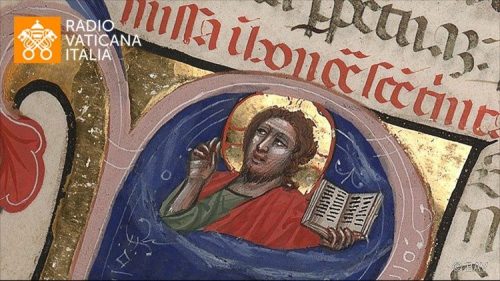READING OF THE DAY
RV 4:1-11
I, John, had a vision of an open door to heaven,
and I heard the trumpetlike voice
that had spoken to me before, saying,
“Come up here and I will show you what must happen afterwards.”
At once I was caught up in spirit.
A throne was there in heaven, and on the throne sat one
whose appearance sparkled like jasper and carnelian.
Around the throne was a halo as brilliant as an emerald.
Surrounding the throne I saw twenty-four other thrones
on which twenty-four elders sat,
dressed in white garments and with gold crowns on their heads.
From the throne came flashes of lightning,
rumblings, and peals of thunder.
Seven flaming torches burned in front of the throne,
which are the seven spirits of God.
In front of the throne was something that resembled
a sea of glass like crystal.
In the center and around the throne,
there were four living creatures
covered with eyes in front and in back.
The first creature resembled a lion, the second was like a calf,
the third had a face like that of a man,
and the fourth looked like an eagle in flight.
The four living creatures, each of them with six wings,
were covered with eyes inside and out.
Day and night they do not stop exclaiming:
“Holy, holy, holy is the Lord God almighty,
who was, and who is, and who is to come.”
Whenever the living creatures give glory and honor and thanks
to the one who sits on the throne, who lives forever and ever,
the twenty-four elders fall down
before the one who sits on the throne
and worship him, who lives forever and ever.
They throw down their crowns before the throne, exclaiming:
“Worthy are you, Lord our God,
to receive glory and honor and power,
for you created all things;
because of your will they came to be and were created.”
GOSPEL OF THE DAY
LK 19:11-28
While people were listening to Jesus speak,
he proceeded to tell a parable because he was near Jerusalem
and they thought that the Kingdom of God
would appear there immediately.
So he said,
“A nobleman went off to a distant country
to obtain the kingship for himself and then to return.
He called ten of his servants and gave them ten gold coins
and told them, ‘Engage in trade with these until I return.’
His fellow citizens, however, despised him
and sent a delegation after him to announce,
‘We do not want this man to be our king.’
But when he returned after obtaining the kingship,
he had the servants called, to whom he had given the money,
to learn what they had gained by trading.
The first came forward and said,
‘Sir, your gold coin has earned ten additional ones.’
He replied, ‘Well done, good servant!
You have been faithful in this very small matter;
take charge of ten cities.’
Then the second came and reported,
‘Your gold coin, sir, has earned five more.’
And to this servant too he said,
‘You, take charge of five cities.’
Then the other servant came and said,
‘Sir, here is your gold coin;
I kept it stored away in a handkerchief,
for I was afraid of you, because you are a demanding man;
you take up what you did not lay down
and you harvest what you did not plant.’
He said to him,
‘With your own words I shall condemn you,
you wicked servant.
You knew I was a demanding man,
taking up what I did not lay down
and harvesting what I did not plant;
why did you not put my money in a bank?
Then on my return I would have collected it with interest.’
And to those standing by he said,
‘Take the gold coin from him
and give it to the servant who has ten.’
But they said to him,
‘Sir, he has ten gold coins.’
He replied, ‘I tell you,
to everyone who has, more will be given,
but from the one who has not,
even what he has will be taken away.
Now as for those enemies of mine who did not want me as their king,
bring them here and slay them before me.'”
After he had said this,
he proceeded on his journey up to Jerusalem.
WORDS OF THE HOLY FATHER
The Word of God is not “a comic strip” to be read, but a lesson to be listened to with the heart and to be practised every day. A commitment accessible to all, because although “we have made it a bit difficult”, Christian life is “simple, simple”. In fact, “to listen to the Word of God and practise it” are the only two “conditions” established by Jesus for those who want to follow him.
For Pope Francis, this sums up the meaning of the Readings from Mass […]. During the Mass at Santa Marta, the Pontiff paused on the passage from the Gospel […] which speaks of Jesus’ mother and brethren who “could not reach him for the crowd”. Beginning with the observation that Jesus spent most of his time “on the street, with the people”, the Bishop of Rome pointed out that among the many who followed him there were people who heard “in him a new authority, a new way of speaking”, they heard “the power of salvation” that he offered. In this regard, the Pope indicated that “it was the Holy Spirit who touched their heart”.
However, the Pope noted that there were also people mixed among the crowd who followed Jesus with ulterior motives. Some “out of convenience”, others perhaps out of a “desire to be better”. A bit like us today, he said, in that “so often we go to Jesus because we need something and then we forget him there, alone”. The story repeats itself, seeing that even then Jesus sometimes admonished those who followed him. That is what happens, for example, when Jesus says to the people: “You come to me not to hear the Word of God but because I fed you the other day”; or with the ten lepers, of whom only one came back to thank him, while “the other nine were happy with their health and forgot about Jesus”.
Despite all this, the Pope affirmed, “Jesus continued to speak to the people” and to love them to the point of defining “that immense crowd as ‘my mother and my brethren’”. Thus, the family of Jesus are “those who listen to the Word of God” and “put it into practise”. This, Pope Francis stated, “is the Christian life: nothing more. Simple, simple. Perhaps we have made it a bit difficult, with so many explanations that no one understands, but Christian life is like this: listening to the Word of God and practising it. This is what we prayed for in the Psalm: ‘Guide me, Lord, in the way of your commands’, of your Word, of your Commandments, in order to practise” them.
He then invited that one should “truly listen to the word, in the Bible, in the Gospel”, meditating on the Scriptures to put their content into practise every day. But, the Pontiff clarified, should we scan the Gospel superficially, “this is not listening to the Word of God: this is reading the Word of God, as if one would read a comic strip”. While to listen to God’s Word is “to read it” and ask oneself: “What does this say to my heart?”. Only in this way, in fact, “does our life change”. This happens “every time we open the Gospel and read a passage and ask ourselves: ‘Is God speaking to me with this, is he saying something to me’?”.
This means “to listen to the Word of God, to listen with the ears and listen with the heart, to open the heart to God’s Word”. On the other hand, “Jesus’ enemies listened to Jesus’ words but they were close by in order to try and find a mistake, to make him slip up” and make him lose “authority. But they never asked themselves: ‘What is God telling me with these words’?”.
Moreover, the Pontiff added, “God does not speak only to all but he speaks to each one of us. The Gospel was written for each one of us. And when I pick up the Bible, when I pick up the Gospel and read it, I must ask myself what the Lord is saying to me”. This, then, “is what Jesus says that true relatives do, his true brethren: they ‘listen to the Word of God with the heart’. And then, he says ‘they put it into practise’”.
Of course, Francis recognized, “it is easier to live calmly without being concerned with the requirements of God’s Word”. However, “the Father also did this work for us”. Indeed, the Commandments are really “a means of practising the Word of the Lord”. And the same holds true for the Beatitudes. The Pope observed that there in that passage from the Gospel according to Matthew “is everything we must do in order to put the Word of God into practise”.
Last “are the works of mercy”, which also appear in the Gospel of Matthew, in Chapter 25. In short, these are examples “of what Jesus wants when he asks us to put the Word ‘into practise’”.
In conclusion, the Pontiff summarized his reflections, recalling that “so many people followed Jesus”, some of them “for the novelty”, others “in need of hearing a good message” but in reality there were not many who then effectively “practised the Word of God”. Yet “the Lord did his work because he is merciful and he forgives everyone, he calls everyone back, he awaits everyone, because he is patient”.
Even today, the Pope highlighted, “so many people go to Church to hear the Word of God, but perhaps they do not understand the preacher when he preaches something a bit difficult; or they do not want to understand. Because this is also true: many times, our heart does not want to understand”. But Jesus continues to welcome us, “even those who go and listen to the Word of God and then betray him”, as did Judas who calls him “friend”. The Lord, Francis reiterated, “always plants his Word”, and in exchange “he asks only for an open heart to listen to it and good will to put it into practise. This is why today’s prayer is that of the Psalm: ‘Guide me, Lord, in the way of your commands’, that is, on the path of your Word, so that, with your guidance, I may learn to practice it”.
(Santa Marta, 23 September 2014)

